King Silver Flair - Buying Advice
-
Thanks again for all the quick replies!
@dr-go said in King Silver Flair - Buying Advice:
I think when it comes to valve oil, it's more the preference of the player than it is about the horn. I find that my Ultrapure works equally well on my 1939 Olds Super Recording as it does on my 2017 Harrelson Summit.
Ok, that's interesting. Perhaps I will try a few then. But given that the whole valve section will have to be washed out after each new oil I try, this could take a while!
@flugelgirl said in King Silver Flair - Buying Advice:
@trumpetlearner Proper measurement is needed for felts and water key corks, so better to leave that to your local tech. Especially during these times, I recommend a professional clean on any used horn before you play it - you don’t know where it’s been or what has been living in it!
I will look around for a local specialist, but it's difficult to know whom to trust with something old/rare - plus most places are closed here at the moment. I've been wondering about that 'professional cleaning'. What is it they do that is so different from a good soaking in soapy warm water, and cleaning out with brushes?
@j-jericho said in King Silver Flair - Buying Advice:
@trumpetlearner There's a seller on eBay who sells kits that include felts, corks, and springs. In the notes, it says that if you're not sure if they'll fit your horn, just contact them.
I did see that seller I think - I might contact them. I just thought that as we have access here, to actual Silver Flair owners, that one of them will hopefully be along to advise.
-
If the valves are worn it can affect the compression, making the horn harder to play. Open the 1st and 3rd valve slides a bit, then close them and depress the first and third keys, If you hear a solid popping sound, the compression is good and you can use either a light or medium grade ( Hetman or Berp ) #1 or #2 oil. But if the pop is weak a thick #3 grade oil should fill the gap between the valve and the piston wall and the playing should be easier and you should hear more of a pop.
The thicker oil lasts longer between oiling.George
-
I will look around for a local specialist, but it's difficult to know whom to trust with something old/rare - plus most places are closed here at the moment. I've been wondering about that 'professional cleaning'. What is it they do that is so different from a good soaking in soapy warm water, and cleaning out with brushes?
@j-jericho said in King Silver Flair - Buying Advice:
@trumpetlearner There's a seller on eBay who sells kits that include felts, corks, and springs. In the notes, it says that if you're not sure if they'll fit your horn, just contact them.
The difference with a professional cleaning is that we use chemicals after that soap and water bath that help break down calcification that soap and water can’t, followed up by a flushing system to remove all that junk completely. You really don’t want to know what I see flush out of old horns at the end - it’s super nasty! I work on lots of vintage and new horns, and as far as cleaning goes it’s all the same with one exception - don’t clean vintage with ultrasonics. Any possible spots of red rot can open up pinholes in a UC clean, so if I have any suspicions of red rot I do a chemical soak instead.
As far as cork/felt kits go, no need to buy and install yourself if you take it for a clean, as that is generally included in the cost of the cleaning. Also, I don’t know if they are selling stuff that truly fits or not, and you could end up paying as much or more as from the local shops that really need your support right now. If you don’t know reputable places in your area, check with local musicians, college and/or high school band directors. Always good to start a good relationship with your local techs, and they will go above and beyond to help you when you need them! -
@georgeb said in King Silver Flair - Buying Advice:
If the valves are worn it can affect the compression, making the horn harder to play. Open the 1st and 3rd valve slides a bit, then close them and depress the first and third keys, If you hear a solid popping sound, the compression is good and you can use either a light or medium grade ( Hetman or Berp ) #1 or #2 oil. But if the pop is weak a thick #3 grade oil should fill the gap between the valve and the piston wall and the playing should be easier and you should hear more of a pop.
The thicker oil lasts longer between oiling.George
This is brilliant - thanks George!
@flugelgirl said in King Silver Flair - Buying Advice:
The difference with a professional cleaning is that we use chemicals after that soap and water bath that help break down calcification that soap and water can’t, followed up by a flushing system to remove all that junk completely. You really don’t want to know what I see flush out of old horns at the end - it’s super nasty! I work on lots of vintage and new horns, and as far as cleaning goes it’s all the same with one exception - don’t clean vintage with ultrasonics. Any possible spots of red rot can open up pinholes in a UC clean, so if I have any suspicions of red rot I do a chemical soak instead.
As far as cork/felt kits go, no need to buy and install yourself if you take it for a clean, as that is generally included in the cost of the cleaning. Also, I don’t know if they are selling stuff that truly fits or not, and you could end up paying as much or more as from the local shops that really need your support right now. If you don’t know reputable places in your area, check with local musicians, college and/or high school band directors. Always good to start a good relationship with your local techs, and they will go above and beyond to help you when you need them!Thanks for explaining that, I didn't know what was invloved. I do want to make sure the trumpet is thoroughly cleaned, but I quite like doing these things myself. I enjoy the learning process, and there is a certain satisfaction in accomplishing things without having to pay and rely on someone else. Mind you, judging by the valves, I think the trumpet has already been given a professional clean. Here is a photo:
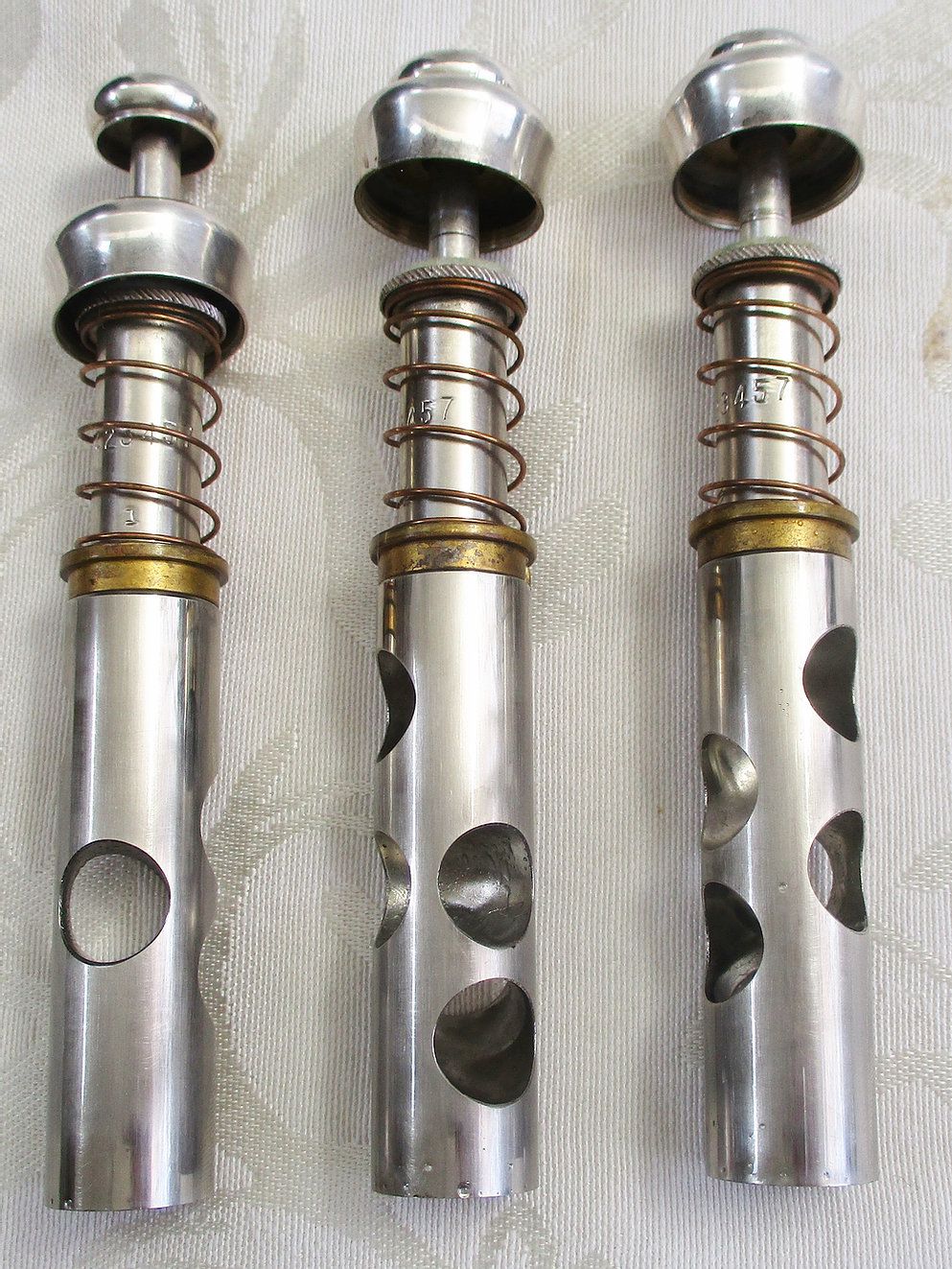
-
@trumpetlearner take a look inside the slides. If you see green, that’s calcification that needs to be removed. There is nothing wrong with doing proper maintenance yourself - a regular home clean can extend the time you need between pro cleanings and extend the life of your horn. A professional clean is great in addition, especially if your horn is older or if you tend to have very acidic skin, and also if you play a lot. One never replaces the other - they work together to give you horn a longer life, and a better playing experience for you. Generally, horns will need a pro clean every 1-3yrs depending on your playing and cleaning habits.
-
@flugelgirl Thanks a lot for the tips, the trumpet hasn't arrived yet, but once it gets here I'll check it over, and update the thread.
I'm wondering about the case though. I like the fact that it comes with the original case, which appears to be in good condition. But I can't help feeling as though a used case is the most unhygenic thing ever! I mean the lining has basically been soaked in someone else's saliva for decades. At least an instrument can be fully cleaned and sterilised, but can the lining of a trumpet case even be cleaned?
-
@trumpetlearner Everything can be cleaned; with oldish cases, it's usually quite a chore. I suggest that you store the original case safely away and invest in a sturdy gig bag that can hold not only your horn, but all the odds and ends you are likely to need. With me - active in about four different wind and brass bands, two symphony orchestras and one and a half big bands, that means not only the obvious oil, grease, snake and cloth; there's pegs to secure the music on windy outdoor venues (enough to help out two colleagues), two music stand lights, spare batteries, a small multi-tool, trumpet stand(s), pad, pencil, sharpener, rubber, usually there's even a spare shirt (I once had a hot dog thrown at me by a drunk guy during a beer festival gig)... some of the other guys even keep a few condoms in their gig bags, just in case!
-
@barliman2001 The condom is useful when someone asks to try your horn or mouthpiece. Just slip the condom over the mouthpiece, and let them have at it.
-
So, my Silver Flair finally arrived today! I love it!!


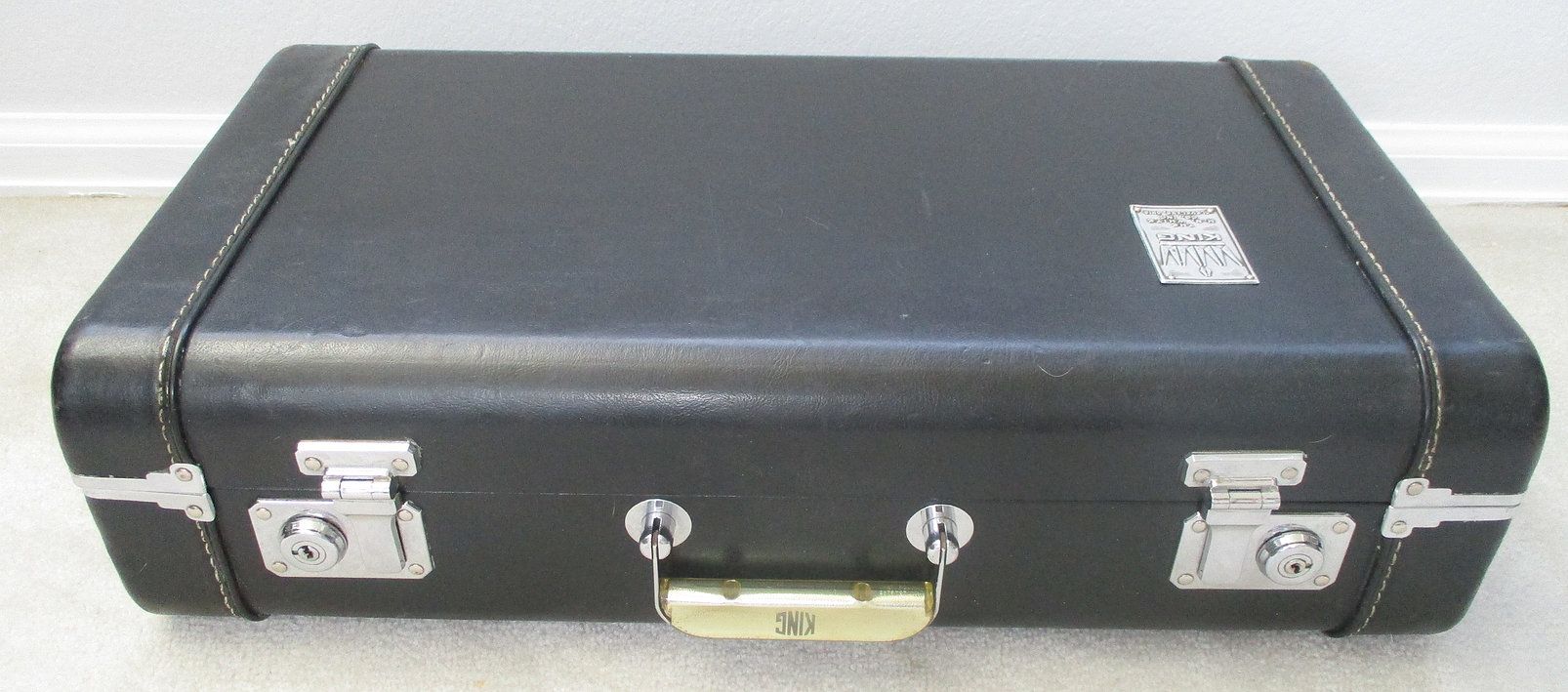
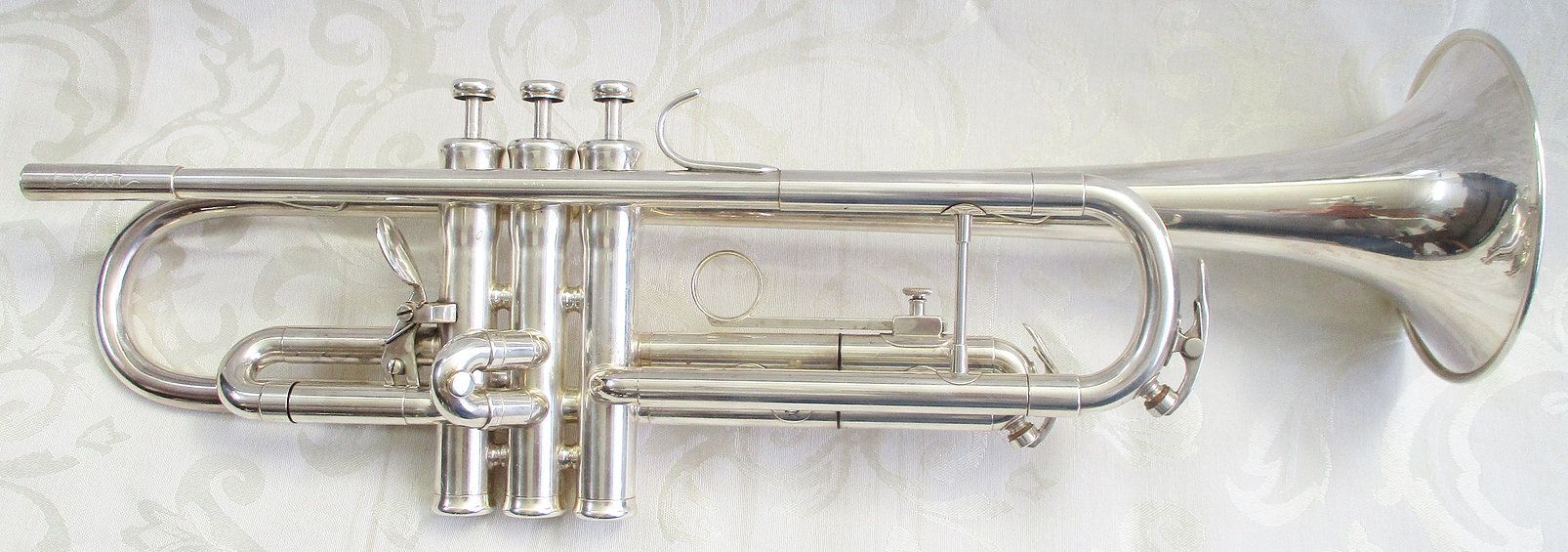
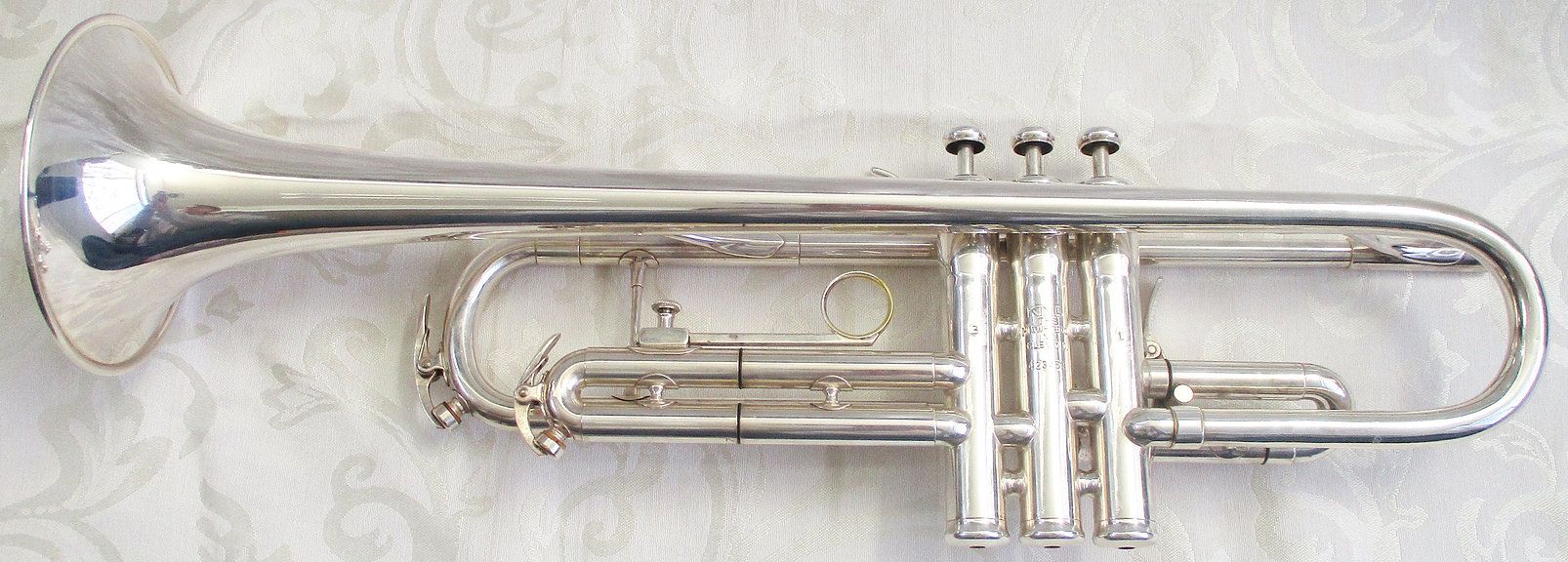
The trumpet needs a clean, but with my own mouthpiece, I tried playing a few notes and it sounded great. Note: I'm a beginner, and this is only the second trumpet I have ever seen in real life.
 So, having only ever played on my Yamaha, I was very much looking forward to experiencing another instrument. My experience was that the notes felt closer together, as if less adjustment was required to change note. Also, going towards the top of the staff seemed to require less effort. I wonder if this an expected result for this trumpet, or just my own experience?
So, having only ever played on my Yamaha, I was very much looking forward to experiencing another instrument. My experience was that the notes felt closer together, as if less adjustment was required to change note. Also, going towards the top of the staff seemed to require less effort. I wonder if this an expected result for this trumpet, or just my own experience?I'm really quite astonished at the condition of both the case and the trumpet, given that it's 55 years old. The hardware on the case basically looks brand new, with both keys included, and both locks working correctly.I scoured the trumpet, looking for damage and was only able to find the tiniest ding in the bell, and a couple of very small scratches. Compression seems to be good too, and the condition of the valves is amazing (pictured in a previous post above). I definitely got a great deal.
@flugelgirl You were right about there being some green calcification on the inside of the slides. The worst of it seems to be on the 2nd valve slide actually. It was quite difficult to photograph, but I did my best:
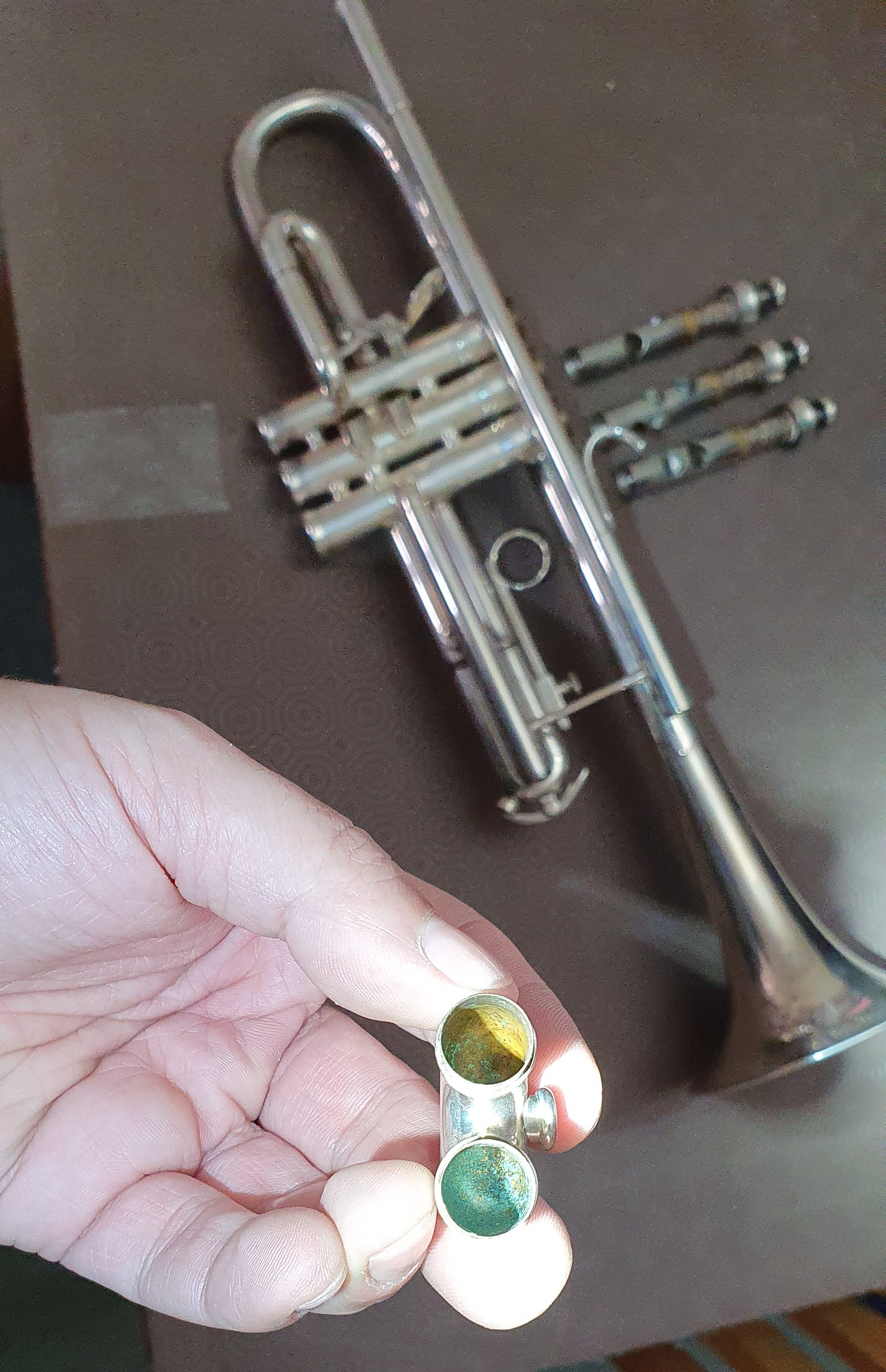
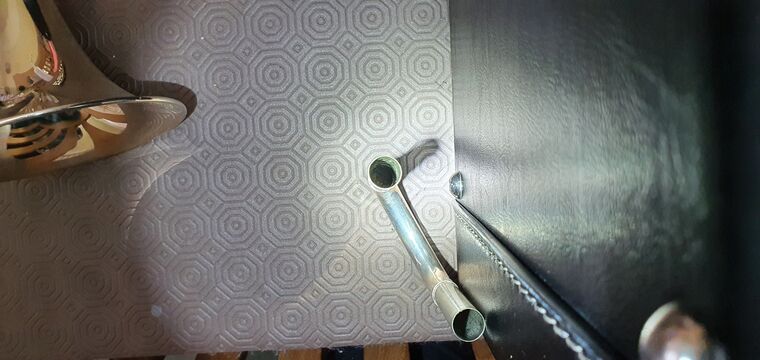
So, based on this, I think I will follow your recommendation of getting a chemical clean done. Is there any downside to putting chemicals through the instrument?
Also, I noticed that the 1st & 3rd valve slides, both have rubber O-rings on them. Haven't seen this before, so I was wondering if it's correct for this model?
Thanks for everyone's advice and information - hopefully this thread will also be of use to anyone else looking for a Silver Flair in the future.
-
Nice looking horn. Some trumpets are more responsive than others, making them easier to play. The King may be better than your Yamaha in this case.
As far as rubber O-rings go, they are sometimes added by owners. The purpose of the rings is to remove any clicking sounds when using the 1st and 3rd valves. I was advised to not use rubber rings on my two silver horns. -
@trumpetlearner Nice eye candy.
I use neoprene o-rings on all my horns, including the silver ones. Olds included square-edged o-rings on trigger slides on their trumpets and cornets. I don't recall what they were made of (maybe rubber?), but they were sort of tan-colored and tended to get brittle with time.
-
Ahhhh, that makes a lot of sense! It does seem like a good idea to stop that clanking sound of the slides closing.
I found this, from 1968:
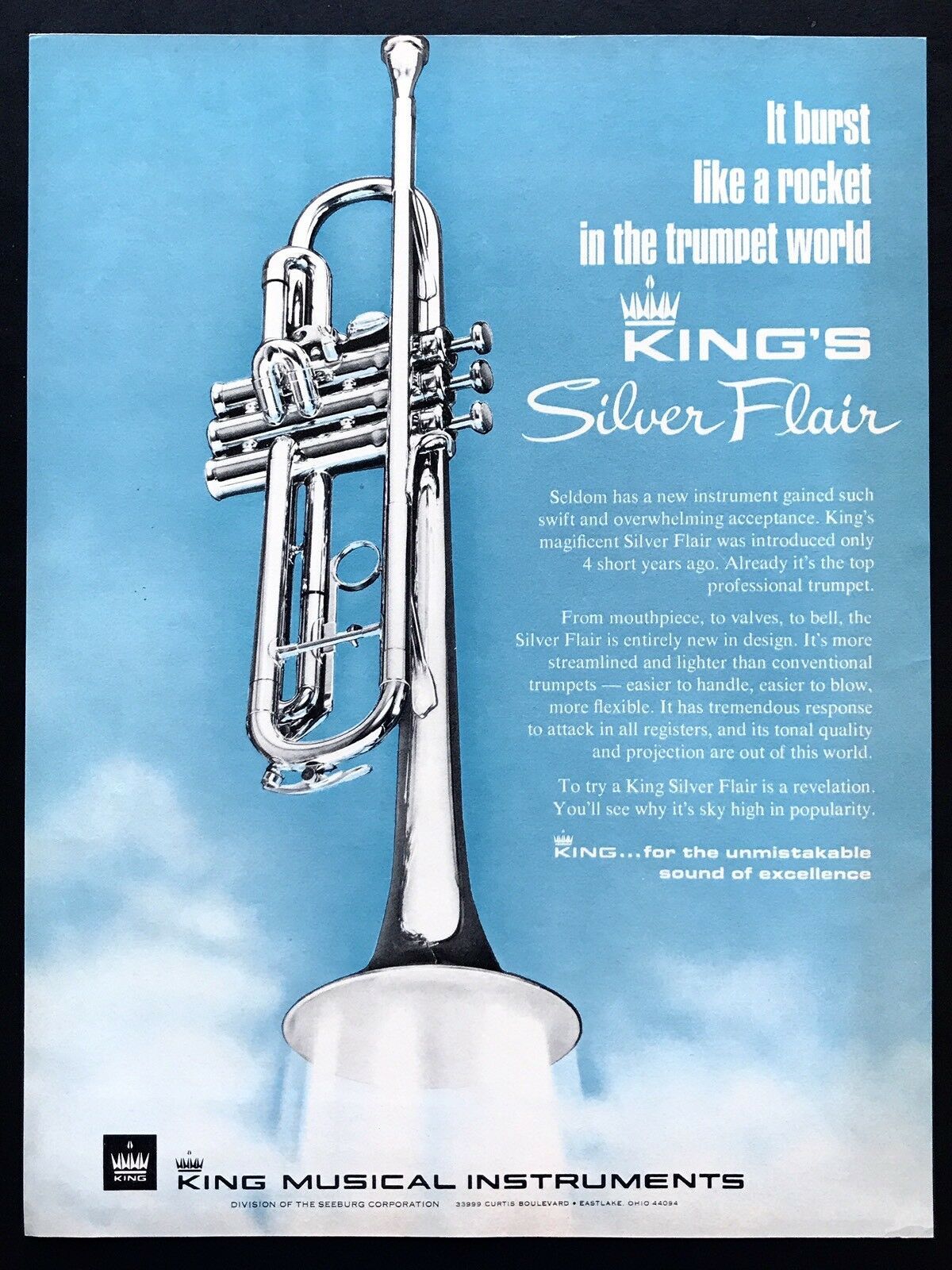
So, it looks like they were sent from the factory with the O-rings in this case.
-
I noticed that on this trumpet, the stems of the valves each have the instrument's serial number stamped on them. This is a great touch, because it allowed me to know that they were original.
I now notice that the 3rd valve slide also has the last three digits of the serial stamped on the underside. However, none of the other slides have this. So, I was wondering....does this mean the other slides may not be original? If not, why only stamp the 3rd valve slide, and not the others?
What markings does your Silver Flair have?